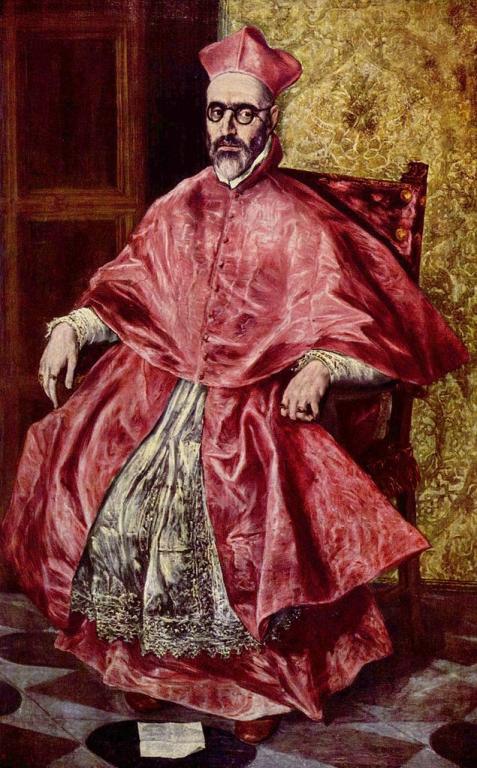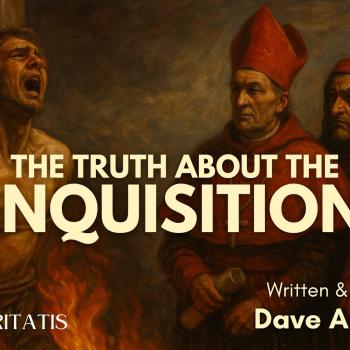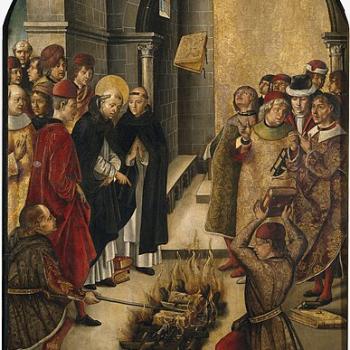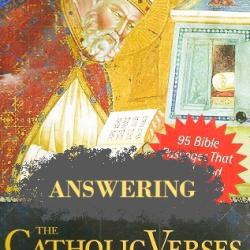
Fernando Niño de Guevara, Grand Inquisitor of Spain, 1600-02, by El Greco (1541-1614) [public domain / Wikimedia Commons]
***
(1998; Addendum added on 11-2-03)
***
The following is from my Apologetics/Ecumenism discussion list. My opponents’ words will be in blue:
* * *
There is a fairly obvious example of a moral teaching that the church, from the apostles onward, got stunningly wrong, and which was not corrected by Christendom until the mid-19th century. I refer to slavery.
This is factually incorrect. I have links on my Catholic “Scandals” Page (and further documentation below) which show beyond dispute that the Catholic Church opposed slavery, especially the wicked, New World variety. American history is not synonymous with Church history!
Slavery is condoned in the New Testament by the two preeminent apostles, Peter and Paul, and nowhere is it condemned as evil.
This is an extremely complicated ethical/social question. Suffice it to say here that there is a large similarity between slavery as practiced in antiquity and indentured servanthood, which was a common practice, especially in pre-capitalistic societies. The latter is not necessarily “evil,” provided the servant was treated with dignity, and not like an animal (as indeed many forms of slavery were reduced to). In fact, one might say such “slaves” were treated better than, say, West Virginia Coal Miners or laborers on the railroads or the Panama Canal in the early 1900s (all under a capitalist system). So I don’t think it is as clear-cut as you present it.
The biblical approval of slavery was used as rhetorical ammunition by apologists for the Confederate cause in the Civil War in the 1860s. Christian churches throughout the south defended slavery from their pulpits. Slavery had by then been outlawed in Europe, I believe, but that took over 18 centuries to accomplish.
But this was an example of a sort of slavery which was not merely indentured servanthood. As is often the case, a corrupt and evil practice was defended by an abusive interpretation of the Bible. I can’t speak for Protestants, but the following excerpts from my links about slavery illustrate the view of the Catholic Church:
As early as 873 A. D. (DS 668) Pope John VIII ( to the princes of Sardinia) taught:
There is one thing about which we should give you a paternal admonition, and unless you emend, you incur a great sin, and for this reason, you will not increase gain, as you hope, but guilt. … many in your area, being taken captive by pagans, are sold and are bought by your people and held under the yoke of slavery. It is evident that it is religious duty and holy, as becomes Christians, that when your people have bought them from the Greeks themselves, for the love of Christ they set them free, and receive gain not from men, but from the Lord Jesus Christ Himself. Hence we exhort you and in fatherly love command that when you redeem some captives from them, for the salvation of your soul, you let them go free.
In the Middle Ages slavery, properly so called, no longer existed in Christian countries; it had been replaced by serfdom, an intermediate condition in which a man enjoyed all his personal rights except the right to leave the land he cultivated and the right to freely dispose of his property. Serfdom soon disappeared in Catholic countries, to last longer only where the Protestant Reformation prevailed. (Catholic Encyclopedia)
The Catholic Church unhesitatingly condemned racial slavery as soon as it began. In 1435, six decades before Columbus sailed, Pope Eugene IV condemned the enslavement of the black natives of the Canary Islands, and ordered their European masters to manumit the enslaved within 15 days, under pain of excommunication. In 1537, Pope Paul III condemned the enslavement of West Indian and South American natives, and explicitly attributed that evil, “unheard of before now,” to “the enemy of the human race,” Satan.
In May 1537 (DS 1495) Pope Paul III wrote to the Archbishop of Toledo:
- It has come to our ears. . . that Charles [V] the [Holy] Roman Emperor … to repress those who, eager for gain have an inhuman attitude to the human race, has prohibited by public edict that anyone should presume to reduce to slavery the Western or Southern Indians. … we give orders that. . . to all and each one of any dignity whatsoever … you give strict orders under penalty of automatic excommunication … that they must not in any way presume to reduce the Indians we mentioned into slavery …
Papal condemnations of slavery were repeated by Popes Gregory XIV (1591), Urban VIII (1639), Innocent XI (1686), Benedict XIV (1741), and Piux VII (1815). In 1839, Pope Gregory XVI wrote,
- We, by apostolic authority, warn and strongly exhort… that no one in the future dare to bother unjustly, despoil of their possessions, or reduce to slavery Indians, Blacks or other such peoples.
So who was more “enlightened”?: the slave-holding, Unitarian Thomas Jefferson, or the Catholic Church (popes) of 873, 1435, and 1537? Once again, the truth is far different from the myth. You can blame the early Protestants, perhaps (and this might explain the late maintenance of the evil in the Baptist / Methodist / Presbyterian Bible Belt South), but your argument against the Catholic Church falls flat.
I agree with you that we are not, or should not be, “isolated, atomistic individuals,” and I would like to believe in the spiritual solidarity you perceive in the Church. However, when I look at the history of the Church, I am not so impressed with its accomplishments. If God abandoned control of the Church enough to permit the Crusades and the Inquisition and the rampant anti-Semitism, why should I believe God would ensure doctrinal infallibility in the Church? I dare say that moral behavior ranks a little higher than doctrinal purity in God’s scale of values. Don’t you agree?
Both are important. I think it is easier to understand the rightness of love, as opposed to figuring out all the orthodox teachings (since we have the moral law within us), but neither is optional at all, in the biblical and apostolic perspective. You make my own former argument. This is the battleground in which I fought for my evangelicalism in 1990. :-) But the “sin argument” ultimately fails, for the simple reason that we are all sinners, and our institutions (even if indeed divinely-established) necessarily reflect that.
The examples I always use are King David and Paul and Peter:
David was a murderer and adulterer, yet God – knowing all things – made a covenant with him, for the Messiah to be born in his family line. He was a key figure in Jewish history, wrote many of the Psalms, and was a precursor and type of the Messiah. He truly repented, and that is the thing to remember.
Paul killed Christians, but God converted him, and he went on to write much of the New Testament, and was the first major missionary.
Peter denied Christ three times, yet Jesus (knowing he would do that), made him the Rock (read, pope; head of the Church :-) and gave him the keys of the kingdom.
God clearly uses sinners, because that’s all He has to work with! If it were up to us, this wouldn’t be the case. If I said I had murdered someone because I impregnated his wife (and repented, of course), would you accept me even as a moderator for this list? :-)
The original rationale for the Crusades and Inquisition can be defended (though very meekly by myself — I am not fond of them at all). It is very difficult in our day and age to comprehend a culture in which spiritual errors and transgressions were considered as dangerous and subversive as mere civil infractions. We execute (or imprison for life) some people today for killing someone’s body, yet think nothing about them (in effect) killing someone’s soul and causing them to be damned for eternity, as a result of accepting false teaching. Which is worse?
We slaughter innocent preborn children today and call it “choice,” yet we look down at our noses at medieval Christians who believed it was their duty to fight against the infidel and the heretic, in order to save future generations of children. At least they had some sort of noble motive (flawed though the whole concept was – especially in practice), whereas the abortionist and all his religious apologists have none whatsoever except the Almighty Dollar, being “with it,” personal expedience, and a radically feminist and hedonist social agenda.
But the bottom line with regard to infallibility, is that it is not dependent on impeccability or sinlessness. If it were, I agree we would be in very rough shape! :-) There are a host of myths about the Inquisition(s) and Crusades, far beyond the scope of this reply. Even the BBC admitted in a TV special that the Spanish Inquisition was vastly more fair and just (especially compared to Spanish government courts) than what we hear about from anti-Catholic propaganda, such as the “Black Legend” of Spain.
[Name] offers a fairly decent counter-argument, yet I would point out that the principle of the existence of viewpoints which are heretical has never changed. What changed was an increased understanding of personal culpability, the nature of good faith and sincerity, psychological and social barriers to a correct perception of true Christian teaching, etc. So I would say that the essence hasn’t changed, but the practice and understanding of relative culpability has. This is particularly true relative to the sad scandal of historical anti-Semitism in the Church.
I would say that the Church’s repudiation of slavery as immoral was a sheer reversal of its policy from the apostolic epoch until the 19th century.
Except that this is factually incorrect, as has been clearly shown above.
I believe in progressive revelation. That may be similar to some extent to the Catholic concept of development of doctrine.
Indeed it is, as I have argued in some of my papers on development.
The real issue is whether it is credible that God would care more about keeping the Church free of theological error than he cares about keeping it free of egregious moral error.
We need not make that choice. But you must distinguish between the Church’s moral teaching, and flawed and corrupt moral practice of individuals: which you have not sufficiently done.
Since the latter has not been done, I very much doubt the former.
God didn’t promise to keep us free from sin. That is up to us. He promised to keep the Church free from doctrinal error, just as most Protestants accept an infallible Bible, despite the fact that sinful persons wrote it.
If God cares more about the issue of contraception than he cares about the persecution of Jews and heretics and the slaughtering of infidels, then something must be terribly wrong with the whole concept of the Church.
Again, this is a false dilemma. But even so, the Catholic Church has far and away the finest humanitarian record and history of tolerance, compared to any other institution in world history. Everyone knows our sins and flaws, but we hear little about the overwhelming number of good things we have done and produced: stuff like hospitals, universities, science, the finest art and architecture, Pope Pius XII’s saving of over 850,000 Jews in WWII (estimate of Pinchas Lapide, a Jew himself), etc. But then Jesus said “you would be hated by all for my name’s sake,” didn’t He?
It appears that one would have to believe that slavery in the first century Roman world was morally tolerable if one is committed to the infallibility of the Bible.
This is a fair point to raise, but one (unfortunately) which I don’t have the time to pursue at present (especially in the depth that it deserves). I will have to refer you for now to my links on the subject on my Catholic “Scandals” page, particularly the articles in the Catholic Encyclopedia, which are fairly in-depth. The evangelical New Bible Dictionary has four lengthy pages on the subject, if you can locate that respected reference work somewhere. I’m sure there is much written on it, and I would encourage you to pursue this on your own, as it is “extremely interesting” to you.
I realize this, which is why I was tried to make the case that the Church in its official and supposedly infallible capacity was on the wrong side of some moral issues such as slavery.
I tried to show that it was on the “right” side, at the same time recognizing that it is an exceedingly complicated issue. The Apostles sought neither to be political nor social revolutionaries, although the effect of the gospel was indeed just that. But there is a distinction to be made between a flat-out (NT, apostolic) demand for the end of slavery at that time, or the end of the Roman political and social system, and the establishment of Christianity, which would in time inevitably transform these institutions, and the world. That, in a nutshell, is the rationale behind an evangelical defense of Scripture with regard to slavery. But I wouldn’t presume to know all the ins and outs of the thinking on this.
It’s a typical Christian response to criticism to point out that we are all sinners, etc, which is why I refuse to engage in pointless discussions of how terrible this or that group of Christians has been.
:-) There is a knee-jerk form of that answer, but also a reasoned one, which I hope mine was . . .
My concern is with the two churches (Catholic and Orthodox), each of which purports to be the One True Church which has maintained correct moral and doctrinal teaching throughout its history. At the moment I’m focusing on the Catholic rather than Orthodox church because you’re a Catholic, and also because so far I know less about the history of the Orthodox church in terms of any moral disasters in which it may have had a hand.
I believe that the moral record of the Catholic Church (warts and all) is superior to any other religious or secular institution in world history. Now, granting the foregoing as true for the sake of argument, wouldn’t that be at least one reason to both respect and to join it, whether or not you deem it as totally “acceptable” by your own standards or not? One can despair of all human institutions, I suppose, even those purporting to be divinely-established. It takes faith to believe that the Catholic Church is what it claims to be. Mere historical and ethical analysis of it will not be enough to compel anyone’s assent and obedience.
I have to admit that your quasi-sympathetic explanation of the Crusades and Inquisition makes me very uncomfortable, so conditioned is my reaction of horror to these episodes in history.
I don’t have to defend the practices (certainly not in their actuality – much of which I find appalling and reprehensible, especially some of the atrocities of the Crusades). As a medievalist of sorts myself, I was simply trying to explain the theory and thinking and the medieval mind. It is always good to try to understand a viewpoint from the “inside.” This is very difficult for us moderns, accustomed as we are to the totally-loaded derogatory terms and ways of thinking suggested by Dark Ages, Renaissance, Enlightenment, etc. All of these, by definition, suggest that the Church was repressing thinking and righteousness, until those things were released or rediscovered by the valiant humanists and atheists.
Of course this is sheer nonsense, but it is assumed uncritically. I submit that this is the baggage that you and I and virtually all of us carry with us as we approach “loaded” episodes such as the Inquisition and the Crusades. But don’t you think the average person of the Middle Ages would recoil in horror and disbelief at what has taken place in the 20th century? That works both ways, most assuredly. Our century is exponentially worse than all the centuries of the Middle Ages put together. That can hardly be argued. And that was directly the result of a renewed paganism or secularism or Communism, not because of Christianity.
You point out correctly that the medieval culture was one “in which spiritual errors and transgressions were considered as dangerous and subversive as mere civil infractions [because they risked] … killing someone’s soul and causing them to be damned for eternity, as a result of accepting false teaching.” But the logic of orthodoxy and eternal damnation is such that the medieval rationale for the Inquisition really does make sense, does it not? How can you compare any finite suffering in this life to the infinite misery of damnation? They are incommensurable, as the church reasoned when it controlled Europe.
The logic hasn’t changed; what changed is simply that the church lost its temporal power over life and death. If you believe (I assume a consistent Catholic must believe this) that heresy can lead to damnation, then on what moral basis can you repudiate the Inquisition? To me, the Inquisition has always been a reductio ad absurdum of the church’s official belief in damnation and the tendency of heresy to lead there. But if you start from the premise that heresy constitutes a risk of damnation, the Inquisition would seem to be justified. If not, why not?
Interesting. This would follow as a matter of course if all people were equally subjectively culpable for their false beliefs. In other words, all false belief would be considered identical to willful and obstinate unbelief (i.e., refusal to believe the truth which is known), the type which God will ultimately judge at the end of time. But this is precisely where we have improved upon the understanding of the medievals (one of the rare instances :-).
- The Spanish Inquisition, in spite of wildly inflated estimates of the numbers of its victims, acted with considerable restraint in inflicting the death penalty, far more restraint than was demonstrated in secular tribunals elsewhere in Europe that dealtwith the same kinds of offenses. The best estimate is that around 3000 death sentences were carried out in Spain by Inquisitorial verdict between 1550 and 1800, a far smaller number than that in comparable secular courts.
Edward O’Brien writes:
Fray Tomas de Torquemada, the Grand Inquisitor whose very name is now a symbol of ruthless cruelty, actually checked the excessive zeal of the earlier inquisitors in many ways, including the limiting and mitigating of torture. Walsh thinks that torture under Torquemada was no worse than that used by American police in the 1930s. Also, under Torquemada’s entire tenure as Grand Inquisitor (1483-1498), 100,000 prisoners passed before his various tribunals throughout Spain. Of this number, less than 2% were executed. In Barcelona, from 1488 to 1498, “one prisoner out of 20 was put to death” (23 executions). Torquemada is not the monster of the Black Legend; still, he was responsible for, as an estimation, between 1,000 and 1,500 deaths. And by burning, the common method for those times.
(A New Look at the Spanish Inquisition)
Likewise, Ellen Rice comments:
The Myth of the Spanish Inquisition, a 1994 BBC/A&E; production . . . is a definite must-see for anyone who wishes to know how historians now evaluate the Spanish Inquisition since the opening of an investigation into the Inquisition’s archives. The special includes commentary from historians whose studies verify that the tale of the darkest hour of the Church was greatly fabricated.
In its brief sixty-minute presentation, The Myth of the Spanish Inquisition provides only an overview of the origins and debunking of the myths of torture and genocide. The documentary definitely succeeds in leaving the viewer hungry to know more. The long-held beliefs of the audience are sufficiently weakened by the testimony of experts and the expose of the making of the myth.
. . . In 1567 a fierce propaganda campaign began with the publication of a Protestant leaflet penned by a supposed Inquisition victim named Montanus. This character (Protestant of course) painted Spaniards as barbarians who ravished women and sodomized young boys. The propagandists soon created “hooded fiends” who tortured their victims in horrible devices like the knife-filled Iron Maiden (which never was used in Spain). The BBC/A&E; special plainly states a reason for the war of words: the Protestants fought with words because they could not win on the battlefield.
The Inquisition had a secular character, although the crime was heresy. Inquisitors did not have to be clerics, but they did have to be lawyers. The investigation was rule-based and carefully kept in check. And most significantly, historians have declared fraudulent a supposed Inquisition document claiming the genocide of millions of heretics.
What is documented is that 3000 to 5000 people died during the Inquisition’s 350 year history . . . As the program documents, the 3,000 to 5,000 documented executions of the Inquisition pale in comparison to the 150,000 documented witch burnings elsewhere in Europe over the same centuries.
. . . Discrediting the Black Legend brings up the sticky subject of revisionism. Re-investigating history is only invalid if it puts an agenda ahead of reality. The experts – once true believers in the Inquisition myth – were not out to do a feminist canonization of Isabella or claim that Tomas de Torquemada was a Marxist. Henry Kamen of the Higher Council for Scientific Research in Barcelona said on camera that researching the Inquisition’s archives “demolished the previous image all of us (historians) had.”
(The Myth of the Spanish Inquisition)
Even Henry Charles Lea, the first major American Inquisition historian and no fan of the Catholic Church, says of the calculations of victims:
There is no question that the number of these has been greatly exaggerated in popular belief, an exaggeration to which Llorente has largely contributed by his absurd method of computation….
(A History of the Inquisition of Spain, volume 4, 517)













